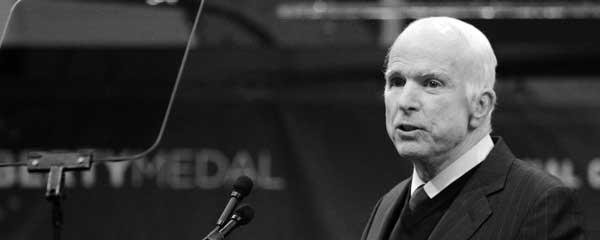GALLUP NEWS SERVICE
PRINCETON, NJ -- Will the war with Iraq turn into "another Vietnam" for the United States? Sunday, on ABC's "This Week," Republican Sen. Chuck Hagel stated that the situation in Iraq is not "dissimilar to where we were in Vietnam," and that "the longer we stay there, the more similarities [to Vietnam] are going to come together." White House counselor Dan Bartlett responded: "We respect Sen. Hagel. He's a decorated Vietnam War veteran. But we couldn't disagree more."
It is obviously too early to predict the verdict of future historians who will compare the two wars. There are significant differences between them, and the Iraq conflict has not yet approached the depth of U.S. involvement in Vietnam, which saw more than 500,000 U.S. troops deployed in that country by 1968 and which ultimately resulted in more than 58,000 U.S. military deaths.
Still, the Iraq war was a major theme in last year's presidential election, as was Vietnam in the elections of 1968 and 1972 -- and the Iraq war is now a dominant subject in news coverage, just as Vietnam was in the 1960s and early 1970s.
An important focus today is the battle for public opinion on Iraq -- as eventually it was in Vietnam. Recent polls showing declining support for the Iraq war in the United States have received much media attention. This has not only prompted President Bush to make speeches explicitly asking for continuing public support for the war (two speeches on Iraq this week alone), but has, in addition, provoked commentators to begin invoking the Vietnam comparison. The highly publicized protest vigil of Cindy Sheehan outside Bush's ranch in Crawford, Texas, has also provoked memories of the protests that ultimately played such a large part in the Vietnam saga.
Just how comparable are the two wars as far as public opinion is concerned? That's a difficult question to answer in many ways. Many of the questions asked then about Vietnam and now about Iraq are quite specific to the circumstances involved and do not allow for perfect comparisons. Plus, the environment in which the Vietnam War played out was significantly different from the environment now. Vietnam began in the middle of the Cold War, just 20 years after the conclusion of World War II. Iraq began in the middle of a "war on terrorism" declared by the Bush administration in the wake of the terrorist attacks of Sept. 11, 2001.
But, there are several Gallup Poll questions asked during both wars that provide some public opinion comparability. An analysis of the trend patterns for each provides important insights into the nature of public opinion in both situations.
Gallup asked the public to assess whether the United States made a "mistake" in sending troops into Vietnam, and has asked the same question since March 2003 about Iraq. Gallup consistently asked Americans to name the "most important problem" facing the country during the years of both conflicts, and to evaluate how the presidents involved were handling both war situations.
The bottom line: Americans were much quicker to consider the Vietnam War to be a major problem facing the country than has been the case for the Iraq war. But at the same time, a majority of Americans began to call Iraq a "mistake" within about a year and three months of its beginning, while it took over three years for a majority to call Vietnam a mistake. Lyndon Johnson's job approval ratings for handling Vietnam dropped to lower levels than has been the case -- so far -- for George W. Bush.
Mistake?
One of Gallup's key measures used to assess public support for both the Vietnam War and the current war in Iraq asks Americans whether or not it was a "mistake" to send troops to those countries. The data trends for both wars (that is, every time the question was asked about Vietnam and every time it has been asked about Iraq to date) are presented in the accompanying graphs.
In order to provide a comparative basis between the two wars, the results have been aggregated into quarterly averages and the trend lines have been plotted, based on the first quarter of the year in which each war began in earnest -- 1965 for Vietnam and 2003 for Iraq. Gallup first asked the "mistake" question about the Vietnam War in August 1965 (the third quarter of the first year of the war) and about the Iraq war in March 2003 (the first quarter of the first year of the war).
As the graph illustrates, Americans have become negative about the war in Iraq more quickly than they did for the Vietnam War.
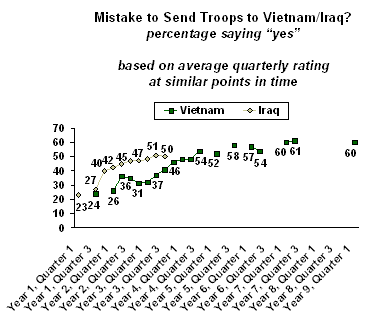
The latest quarterly average for Iraq shows that 50% say it was a mistake to send troops (the most recent single measure on this indicator, from an Aug. 5-7 Gallup Poll, shows 54% saying the war was a mistake).
In the comparable quarter for the Vietnam War (the third quarter of the war's third year -- that is, the third quarter of 1967), Gallup found 41% saying the conflict was a mistake. It was not until the third quarter of the fourth year of the Vietnam War (August-September 1968) that a majority of Americans said the war was a mistake. In short, it took longer for a majority of Americans to view the Vietnam War as a mistake than has been the case for Iraq.
(There is one caveat in these comparisons: A larger percentage of Americans in the Vietnam years said they did not have an opinion about Vietnam than has been the case for Iraq.)
When the war in Iraq started in March 2003, only 23% of adults nationwide said it was a mistake to send troops to Iraq, while three-quarters said it was not a mistake. The percentage of Americans saying it was a mistake gradually increased, and by the end of 2003, it reached the 40% range. By June 2004, just one year and three months after the war began, a majority of Americans reached the conclusion that the war was a mistake.
Since that time, there have been significant fluctuations in the public's responses to this question -- usually in reaction to events relating to Iraq.
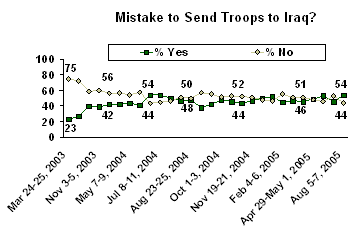
About six months after Johnson began large-scale U.S. involvement in Vietnam in 1965, Gallup found just 24% of Americans saying it was a mistake to send troops, while 60% said it was not. At least a plurality of all Americans continued to say it was not a mistake until July 1967, almost two and a half years after the United States had increased its military presence in Vietnam. In that July poll, a plurality still supported the notion that it was not a mistake to send troops to Vietnam, by a 48% to 41% margin.
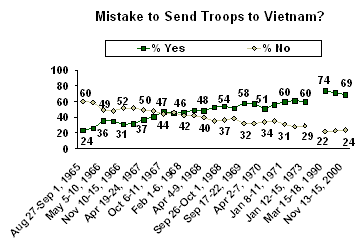
The tide began to turn by October 1967, when more Americans said it was a mistake to send troops to Vietnam (47%) than said it was not (44%). For nearly a year, this pattern persisted.
Finally, in an August 1968 poll, Gallup found for the first time that a majority of Americans, 53%, said it was a mistake to send troops to Vietnam. This was three and a half years into the war.
(Opposition to the Vietnam War, as measured by this "mistake" question, continued to grow, as the percentage of Americans who said it was a mistake averaged 55% in 1969 and 1970, then increased to 60% in 1971 and 1973. When asked this question in retrospect, Americans have continued to say they feel it was a mistake to send troops to Vietnam. Most recently, three polls conducted from 1990 to 2000 found about 7 in 10 Americans saying it was a mistake.)
Most Important Problem
Another measure of public opinion about the nation's involvement in war is provided by responses to Gallup's long-term, open-ended trend asking Americans to name "the most important problem facing the country today."
The number of Americans who identified the Vietnam War as the most important problem facing the country fluctuated significantly over the course of the war. But only a year and a half into the war, in August 1966, an overwhelming 69% identified Vietnam or the war as the nation's top problem. These responses don't necessarily indicate that 69% of Americans thought involvement in Vietnam was a bad decision. But the fact that about 7 out of 10 Americans said Vietnam was the nation's top problem by 1966 shows how quickly it began to dominate the nation's consciousness.
The open-ended mentions of Iraq in response to this question have been much less dominant so far, ranging from 5% in August 2003 to 27% in the latest poll and in a June 2004 poll. (Gallup had found higher percentages mentioning Iraq as the top problem leading up to the start of the war.) Today -- about two years and five months after the war began -- 27% of Americans mention Iraq as the top problem, essentially as high as this measure has gone since the war began in 2003.
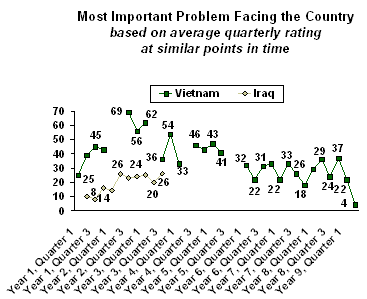
War Approval
Lyndon Johnson
After some 184,000 troops were deployed to South Vietnam by the end of 1965, Gallup found majority approval for Johnson's handling of Vietnam in four separate polls.
But this was the only time that a majority would support Johnson's handling of Vietnam.
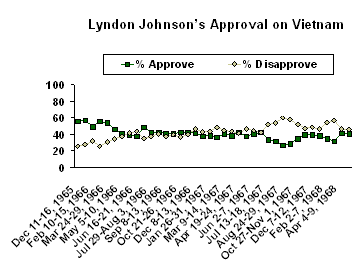
By mid-April of 1966, fewer than half of all Americans, 47%, approved of Johnson's handling of Vietnam. From May to December 1966, Johnson's Vietnam approval showed a slight dip, averaging 42% during that period. In May and June 1966, for the first time, more Americans disapproved than approved of Johnson's handling of the war.
A decline that was more obvious occurred in 1967, with approval averaging 37% for the year and falling as low as 27% in August, which would be the low point in Johnson's administration.
George W. Bush
Bush's Iraq approval ratings were quite steady, with an average of 54%, prior to the start of the war in March 2003. Immediately following the initiation of military action in Iraq, Bush's approval on Iraq spiked to 71%. It increased to 76% after the fall of Baghdad in mid-April. A month and a half after Bush announced the end of major combat in Iraq on May 1, 2003, his approval rating on Iraq decreased to 63%.
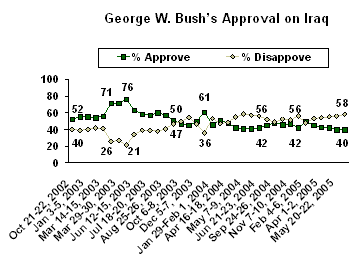
Bush's Iraq approval remained quite steady in July and August 2003, ranging between 57% and 60%. Moving into the fall of 2003, the ratings started to decrease, from 51% in September to 47% in October to 45% in November. In early December, Bush's Iraq rating was 50%. This increased to 61% in an early January 2004 poll, the first Gallup Poll conducted after the capture of Saddam Hussein.
After the post-capture 61% rating, Bush's Iraq approval dropped to 46% in late January and early February 2004. These ratings increased slightly to 51% in March, before dropping back to 48% in April amid reports describing numerous attacks against U.S. soldiers in Iraq. After media reports in early May detailed incidents of U.S. soldiers abusing Iraqi prisoners at Abu Ghraib, Bush's Iraq approval dropped to 41%. In the last half of 2004, Bush's ratings on Iraq improved, ranging from 42% to 48%.
Bush's approval ratings on Iraq have been in the low 40% range throughout this year, with the exception of a 50% rating following the elections in Iraq in late January. His most recent Gallup Poll rating, from a June 24-26 poll, is the lowest of his administration, at 40%.
In summary, Bush's ratings on Iraq -- so far -- have been higher than Johnson's ratings on Vietnam. Bush now averages a 51% approval rating on Iraq across 36 polls conducted from October 2002 through June 2005. Johnson averaged only 41% over 38 polls from December 1965 to May 1968.
Summary
Although public support for both the Vietnam and the Iraq wars was strong as each conflict began, at least as measured by Gallup's "mistake" question, opposition to the latter has escalated much more quickly. Within a year and three months of the Iraq war's inception, a majority of Americans said it was a mistake. It wasn't until over three years after the inception of the Vietnam War that a majority called it a mistake.
At the same, Americans much more quickly perceived that the Vietnam War was a major problem facing the United States, with over two-thirds naming it as the nation's most important problem within the war's second year. By contrast, even today, some two years and five months after the Iraq war began, only a little more than a fourth of Americans say it is the nation's top problem.
In short, Americans have been quicker to oppose the Iraq war, but less likely to consider it the top problem facing the nation.
With all of this, it is worth remembering that a good deal of the significant societal impact of the Vietnam War did not take place until long after the war's two-and-a-half-year mark (essentially where the Iraq war is today). Vietnam continued to be a major factor in American life as late as the presidential election of 1972 -- some seven years after it began. And -- as noted above -- the cost of the Vietnam War in terms of human lives was ultimately many degrees higher than the cost of the Iraq war so far. But the fact that a majority of Americans already say Iraq was a mistake, and that it has become perhaps the most significant issue facing the Bush administration today suggests that comparisons between the two situations are not totally unreasonable.
Survey Methods
These results are based on telephone interviews with randomly selected national samples of at least 1,000 adults, aged 18 and older. For results based on these samples, one can say with 95% confidence that the maximum error attributable to sampling and other random effects is ±3 percentage points. In addition to sampling error, question wording and practical difficulties in conducting surveys can introduce error or bias into the findings of public opinion polls.
